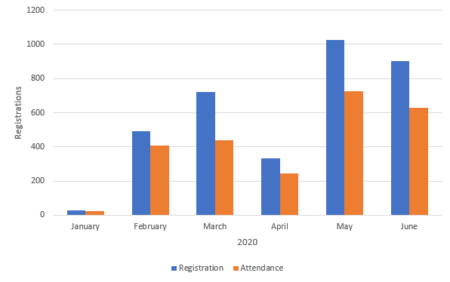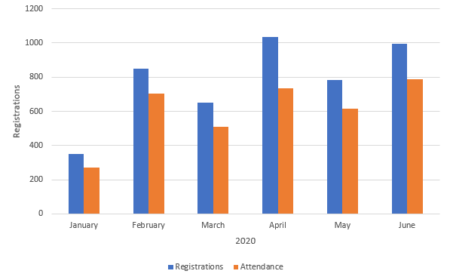Ms Charlotte Ferrier, Senior Graduate Research Development Coordinator, University of South Australia
Dr Myra Lee, HDR Development Coordinator, University of Queensland
Introduction
COVID-19 has necessitated rapid change for universities in all areas of practice – not least graduate researcher skills development. As the pandemic peaked in late March 2020, graduate research development teams and Higher Degree by Research (HDR) candidates struggled to maintain delivery and engagement in skills development programs as campuses closed and in-person interactions were limited. These rapid changes reflected the wider community; McKinsey & Company reporting suggests nearly 50% of in-person professional development in North America would be cancelled by mid-20201. New approaches were required to support HDR candidates to pivot research plans and manage the personal challenges presented by COVID-19.
Since the 2016 ACOLA review of the Australian research training system, graduate research development teams have expanded opportunities for HDR candidates to develop a broad range of research and transferrable skills through various frameworks. At the University of South Australia (UniSA), HDR candidates drive their development through UniSAEDGE (https://www.unisa.edu.au/unisa-edge); launched in 2019, EDGE caters for around 1100 HDR candidates. The University of Queensland’s (UQ) Career Development Framework (https://cdf.graduate-school.uq.edu.au/), introduced in 2015, delivers development opportunities to approximately 4500 HDR candidates.
University of South Australia
In the first, pre-pandemic, quarter of 2020, nearly 70% of UniSA HDR candidates engaged in skills development activities. With close to 80% of these activities delivered in-person, the impact of COVID-19 was significant. However, as University advice on access to resources and facilities crystallised, HDR candidates sought to make continued, albeit adapted, progress. Additionally, a need to provide holistic support for HDR candidates was emerging, to help them build and maintain resilience through the pandemic. As part of a suite of responses, UniSA utilised EDGE to address these critical issues by:
- Introducing a “Research in COVID Times” webinar series focused on the challenges of managing self and research during the pandemic.
- Making regular contact with HDR candidates about current training and development opportunities.
- Proactively engaging with training providers to determine how to adapt existing content for online delivery.
- Fortnightly COVID-focused tracking of HDR candidate activity engagement patterns to inform EDGE programming strategy.
The 9-session “Research in COVID Times” series addressed queries about adapting to the pandemic, both professionally and personally. Delivered online, the candidate-driven thematic series quickly harnessed internal expertise from UniSA researchers to address topics relevant to HDR candidates agnostic of discipline or location. The series covered strategies for dealing with uncertainty, establishing new routines, adapting research techniques for online environments, social media for research network expansion and the changing post-PhD job market. Candidates responded positively to the series, held weekly throughout June and July, and feedback recognised the sense of community it offered for candidates to connect and support one another through isolation.
Figure 1 presents a snapshot of UniSA HDR candidate skills development engagement; the impact of COVID-19 is evident in the April figures, followed by a rebound in candidate engagement following the implementation of UniSA’s response strategies.
Figure 1: UniSA: HDR engagement in skills development activities January – June 2020

A comparison of HDR candidate engagement across Q1 (pre-pandemic) and Q2 (pandemic-affected), revealed:
- An 8% increase in skills development engagement from Q1 to Q2.
- A 52% increase in the average number of available activities (Q1: 23 per month Q2: 35 per month).
- An 89% increase in activity bookings from the previous quarter (Q1: 1156; Q2: 2191; includes bookings in future quarters).
- Consistently high attendee satisfaction; on average, 98% of candidates found EDGE activities engaging across both quarters.
- Higher-than-usual engagement in the COVID series: 80% average attendance compared to 70% average attendance pre-pandemic.
University of Queensland
UQ began planning in 2019 for additional remote learning opportunities, responding to feedback from part-time and remote HDR candidates. Recognising that 76% of HDR candidates at UQ are full-time and spread across four main campuses, face-to-face delivery would continue in 2020 at these campuses, supplemented with 10 webinars. From December 2019 to February 2020, several workshops were piloted in online-only mode as well as simultaneous face-to-face with online delivery.
Fortuitously, only webinars had been planned for the very week that COVID lockdowns were enforced. The Graduate School worked swiftly with researcher developers to convert all workshop content into an online format, delivering train-the-trainer sessions for external (to UQ) and internal training partners and supporting them as session co-facilitators. Accordingly, all 40 planned face-to-face sessions between late March and end June proceeded via Zoom; a single session was postponed to July.
Recognising increased levels of anxiety among HDR candidates, three COVID-specific sessions were held in Q2, 2020 focussing on mental health and employability. Additionally, a three-day intensive thesis-writing workshop was piloted in July to help late stage HDR candidates to push through to final submission and attend to the broader sense of social isolation felt by many.
Figure 2 shows consistent and increasing engagement of UQ HDR candidates in skills development activities across 2020.
Figure 2. UQ: HDR engagement in skills development activities January – June 2020

Analysis of UQ HDR skills development engagement indicated:
- The impact of COVID-19 on year-on-year attendance rates; 80% in Q1, 2020 compared to 90.4% in Q1, 2019, which may reflect the increased capacity and reach offered by online delivery.
- A 41% increase in attendance between Q1 and Q2, 2020 following the transition to online delivery: Q2: 2136 compared to Q1: 1483.
- Consistently high attendee satisfaction rates; 96% across the period.
Reflections
The rapid pivot to fully online programs offered little scope to adequately plan, test and implement approaches but has presented opportunities to graduate research development teams and HDR candidates by:
- Expanding capacity, particularly for HDR candidates unable to regularly attend on-campus workshops. Evaluation of UniSA’s COVID series found 81% of remote respondents agreed that online delivery had made it easier for them to attend workshops;
- Engaging external trainers previously unavailable to present face-to-face;
- Piloting new content and delivery modes through existing platforms to supplement existing content.
Both institutions found online training was a critical mechanism to empower HDR candidates to maintain engaged in their development and stay connected to their peers, during a period of significant disruption. Strategies adopted by both institutions reflect recommended practice in the wider workplace learning sector, as reported by McKinsey & Company1, namely:
- Proactive engagement with training providers to support readiness for online delivery;
- Active promotion of development opportunities;
- Using development programs to offer context-specific support; in this case, the professional and personal challenges presented by the pandemic.
While HDR candidates have welcomed online training during the pandemic, many are also excited to return to campus as COVID-19 restrictions ease. Graduate research development teams are mindful that not all learning outcomes are effectively delivered online but recognise the value multiple delivery modes offer to maintain and grow HDR engagement with skills development programs. At UQ, online will remain the main delivery mode while social distancing restrictions are in place; both institutions will continue to provide multiple delivery modes to cater to on and off-campus HDR candidates. Looking beyond COVID-19, these experiences may also inform good practice in the design and delivery of researcher development programs in the sector more widely.
We’re interested to hear from others in the sector about what you’ve done to adapt your graduate research development programs during the pandemic. Please comment below to continue the conversation.
References
- Kshirsagar, A., Mansour, T., McNally, L. & Metakis, M., 2020. Adapting workplace learning in the time of coronavirus. [Online]
Available at: https://www.mckinsey.com/business-functions/mckinsey-accelerate/our-insights/adapting-workplace-learning-in-the-time-of-coronavirus
[Accessed 26 August 2020].
Photo by Lukas Blazek on Unsplash

